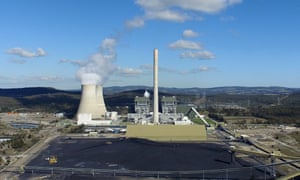The New South Wales
government will introduce legislation to approve an underground coal
mine that was blocked by the courts because it was polluting Sydney’s
drinking water.
On Monday the state’s energy minister, Don Harwin, announced the government would overturn a decision by the NSW court of appeal to block the extension of the Springvale colliery.
The mine, owned by Centennial Coal, is the sole supplier to Lithgow’s Mount Piper power station, which provides about 10% of NSW’s electricity.
On Monday Harwin said the mine was “vital for energy security and affordability”.
“My top priority as energy minister is to ensure NSW households and business have an affordable, secure and reliable energy supply – this decision supports that,” he said.
The legislation, which is expected to be introduced to the parliament this week, will change the NSW Environmental Planning and Assessment Act to “clarify” that “projects in the Sydney water catchment seeking to expand must maintain or improve water quality compared to their existing consent”.
It will also specifically validate the Springvale mine’s State Significant Development consent.
The government’s planning minister, Anthony Roberts, said the legislation would “support the construction of a water treatment plant” which he said would eliminate saline discharges.
“This new treatment plant will see zero mine water discharge into the Coxs River, is supported by the EPA and WaterNSW and has separately been approved by the independent Planning Assessment Commission,” he said.
In August the court of appeal determined that the mine was polluting Sydney’s drinking water and therefore operating on an invalid licence.
After a challenge by environment group 4nature, the court found the commission erred in approving the licence because it involved discharging polluted water into Sydney’s drinking catchment.
The approval involved saline mine water being discharged into the Coxs River, which flows into Lake Burragorang, Sydney’s major drinking-water reservoir.
Centennial Coal has previously denied claims of water contamination and said it faced a “rigorous” and “exhaustive” assessment process that lasted five years.
State planning law requires that developments in the catchment must have a “neutral or beneficial” effect on water quality but the court found the mine’s discharge was having a negative effect.
Energy Australia has argued that the Springvale mine is the only source of coal Mount Piper can use, and without it the power station will not be able to run to the end of its 50-year life in 2042.
The approval will allow Centennial Coal to extract 4.5m tonnes of coal from the mine every year for a further 13 years. However, Springvale’s coal will be depleted within a decade.
The NSW government has characterised the legislation as a measure to protect energy security, as the federal government presses AGL to keep the Liddell power station in NSW’s Hunter Valley open beyond its slated closure date of 2022.
At last week’s Council of Australian Governments meeting Turnbull also sought to put pressure on the NSW premier, Gladys Berejiklian, to approve the controversial Narrabri gas project, declaring the Santos development would reduce domestic gas prices.
On Monday the state’s energy minister, Don Harwin, announced the government would overturn a decision by the NSW court of appeal to block the extension of the Springvale colliery.
The mine, owned by Centennial Coal, is the sole supplier to Lithgow’s Mount Piper power station, which provides about 10% of NSW’s electricity.
On Monday Harwin said the mine was “vital for energy security and affordability”.
“My top priority as energy minister is to ensure NSW households and business have an affordable, secure and reliable energy supply – this decision supports that,” he said.
The legislation, which is expected to be introduced to the parliament this week, will change the NSW Environmental Planning and Assessment Act to “clarify” that “projects in the Sydney water catchment seeking to expand must maintain or improve water quality compared to their existing consent”.
It will also specifically validate the Springvale mine’s State Significant Development consent.
The government’s planning minister, Anthony Roberts, said the legislation would “support the construction of a water treatment plant” which he said would eliminate saline discharges.
“This new treatment plant will see zero mine water discharge into the Coxs River, is supported by the EPA and WaterNSW and has separately been approved by the independent Planning Assessment Commission,” he said.
In August the court of appeal determined that the mine was polluting Sydney’s drinking water and therefore operating on an invalid licence.
After a challenge by environment group 4nature, the court found the commission erred in approving the licence because it involved discharging polluted water into Sydney’s drinking catchment.
The approval involved saline mine water being discharged into the Coxs River, which flows into Lake Burragorang, Sydney’s major drinking-water reservoir.
Centennial Coal has previously denied claims of water contamination and said it faced a “rigorous” and “exhaustive” assessment process that lasted five years.
State planning law requires that developments in the catchment must have a “neutral or beneficial” effect on water quality but the court found the mine’s discharge was having a negative effect.
Energy Australia has argued that the Springvale mine is the only source of coal Mount Piper can use, and without it the power station will not be able to run to the end of its 50-year life in 2042.
The approval will allow Centennial Coal to extract 4.5m tonnes of coal from the mine every year for a further 13 years. However, Springvale’s coal will be depleted within a decade.
The NSW government has characterised the legislation as a measure to protect energy security, as the federal government presses AGL to keep the Liddell power station in NSW’s Hunter Valley open beyond its slated closure date of 2022.
At last week’s Council of Australian Governments meeting Turnbull also sought to put pressure on the NSW premier, Gladys Berejiklian, to approve the controversial Narrabri gas project, declaring the Santos development would reduce domestic gas prices.

No comments:
Post a Comment